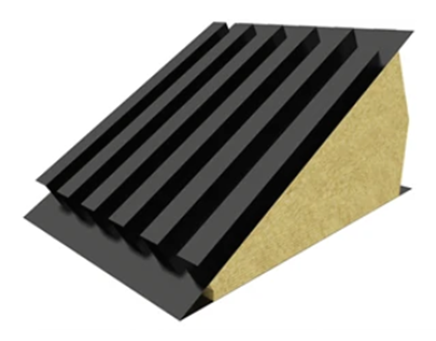Retrofit eaves insulator
The Retrofit Eaves Insulator – invented and patented by Dr Matthew Brooke-Peat MCIAT – is being brought to market through a partnership between Leeds Beckett University and ARC Building Solutions, part-funded by the Government through Innovate UK.
Through the two-year programme, academic experts at Leeds Beckett University's Leeds Sustainability Institute (LSI) and Leeds Business School will support ARC in setting up a specialised new product development department within the business to invent and bring new products to both the retrofit and new-build housing markets.
The pilot project will be the Retrofit Eaves Insulator (REI), invented and patented by Dr Matthew Brooke-Peat MCIAT and co-inventor Professor Christopher Grose, which will allow homeowners to make their dwellings more energy efficient and cost effective.
Dr Matthew Brooke-Peat MCIAT, Course Director of the CIAT-Accredited Architectural Technology programme at Leeds Beckett, explained: "A problem area for insulating existing buildings is at the eaves – the junction between the external walls and roof – which can result in high rates of heat loss. We have seen this in research projects in the LSI and have needed to find a solution to this energy efficiency problem for a long time.
"A large market opening up currently is the retrofit market — thermally upgrading a building; which could be just the loft or the full house, including the walls. The eaves need to be insulated as part of this process – and, where the roof covering is already fitted, this is a tight space. We needed to invent an insulation product that could resolve the problem and be fitted easily in a confined space with restricted access."
The patent has now been licensed by Leeds Beckett University to ARC – with funding of £161,000 through the Government's Knowledge Transfer Partnerships (KTP) programme to support the development of the REI and a whole new product development department for ARC.
ARC are a specialist manufacturer of cavity fire barriers and cavity closers, based in Leeds. The KTP aims to help ARC to grow in the thermal product market and break into the retrofit market – allowing them to grow, innovate, expand and increase profits.

|

|
| Diagram of the Retrofit Eaves Insulator | The Retrofit Eaves Insulator |
Neil Weeks, Managing Director of ARC, said: "ARC has worked in tandem with Leeds Beckett University for a number of years, using expert knowledge and skills to identify heat loss and carbon reduction in the new build sector.
"As market leaders in fire barrier systems and thermal systems for the new build market, ARC are keen to explore the opportunities in the refurbishment sector, using the KTP model to employ a dedicated resource to bring ideas from the drawing board to fruition via the well-developed process.
"The refurbishment sector is a vast market and existing homeowners of properties pre-2005 are in a unique position – to be able to reduce their carbon impact whilst also reducing monthly heating bills.
The KTP will begin with the recruitment of a full-time KTP Associate, who will be an experienced graduate. They will work with ARC and the academic team at Leeds Beckett in establishing the processes and infrastructure needed to set up the new in-house product development department.
The academic team will be led by principal inventor, Dr Matthew Brooke-Peat MCIAT, providing the technical expertise relating to the invention and the construction industry; alongside the team at Leeds Business School, led by Paul Rhodes, Lecturer in strategic marketing and new product development – bringing expertise in finance, management and marketing.
Dr Matthew Brooke-Peat MCIAT said: "It is exciting to see an idea borne out of research coming to fruition as a marketable product, which will then be in use for a positive effect. It's about implementing energy efficiency, which reduces carbon emissions – and in existing buildings.
"If we are going to stand a chance of meeting our targets for carbon emissions, we need to be looking at the existing building stock, which will still be around in 2050 when we are aiming to reach our net zero-carbon target. This invention will help move us towards that. It is exciting to contribute to something so important that could go into many retrofit roof insulation projects going forward. The scale of its potential is vast."
Knowledge Transfer Partnerships (KTPs) aim to help businesses to improve their competitiveness and productivity through the better use of knowledge, technology and skills within the UK knowledge base.
This article is from the CIAT website, published on 7 February 2022. It originally featured on Leeds Beckett University website in September 2021.
--CIAT
[edit] Related articles on Designing Buildings
Featured articles and news
Gregor Harvie argues that AI is state-sanctioned theft of IP.
Preserving, waterproofing and decorating buildings.
Many resources for visitors aswell as new features for members.
Using technology to empower communities
The Community data platform; capturing the DNA of a place and fostering participation, for better design.
Heat pump and wind turbine sound calculations for PDRs
MCS publish updated sound calculation standards for permitted development installations.
Homes England creates largest housing-led site in the North
Successful, 34 hectare land acquisition with the residential allocation now completed.
Scottish apprenticeship training proposals
General support although better accountability and transparency is sought.
The history of building regulations
A story of belated action in response to crisis.
Moisture, fire safety and emerging trends in living walls
How wet is your wall?
Current policy explained and newly published consultation by the UK and Welsh Governments.
British architecture 1919–39. Book review.
Conservation of listed prefabs in Moseley.
Energy industry calls for urgent reform.
Heritage staff wellbeing at work survey.
A five minute introduction.
50th Golden anniversary ECA Edmundson apprentice award
Showcasing the very best electrotechnical and engineering services for half a century.
Welsh government consults on HRBs and reg changes
Seeking feedback on a new regulatory regime and a broad range of issues.
























